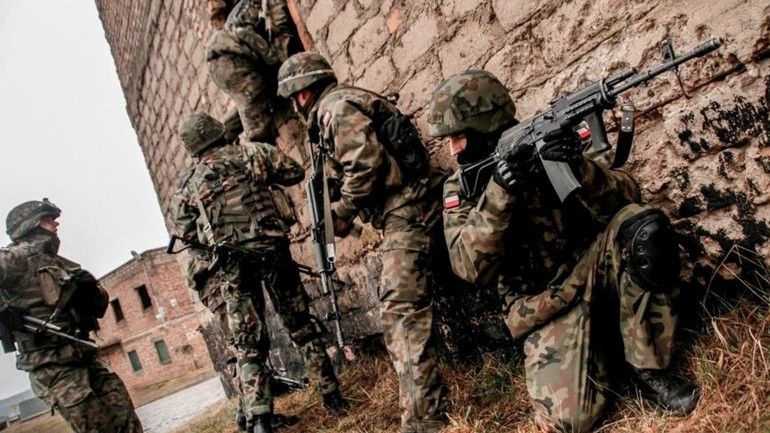Territorial Defence Forces
Jach: More Parliamentary Control Over The Defence Spending. Audit As A Basis For Reinforcing The National Security.

In my opinion, we should go towards expanding the control yielded by the Parliamentary National Defence Commission over the tenders (…) In case of all of our allies, informing the parliament, and, via the parliament, informing the society about spending the assets on modernization, is perfectly normal – as it was stated by MP Michał Jach, in his interview for Defence24.pl. MP Jach works as the head of the Parliamentary National Defence Commission. Not only is the planned audit pertaining the armed forces modernization going to increase the level of national security, as it will also expand the scope of information made available for the parliament and the society.
During the new term of office of the Polish Parliament, the National Defence Commission is going to expand its supervision over the modernization process and defence spending. Throughout the last term, the commission was not in possession of information sufficient to monitor the procurement procedures and the reasons for taking the specific decisions, including the information related to the largest tenders, such as those pertaining the medium range air defence systems or the one related to multi-role helicopters.
In my opinion, we should go towards expanding the control yielded by the Parliamentary National Defence Commission over the tenders. I will try to convince the Defence Minister to increase supervision of the parliament over the expenditure related to the budgetary assets, particularly the money spent on modernization, on procurement of the new equipment. Throughout the last eight years, some deviations could have been observed within that area, and those deviations should have never existed. We could have also witnessed a situation in which we were unable to get information why given equipment was procured, why from that, and not other contractor, and what the procurement price was. Increased parliamentary supervision of the army modernization processes is indispensable, when it comes to the national security interest.
In the NATO member states, the Parliaments are quite frequently actively involved in the process of creating the modernization plans pertaining the armed forces. Germany may be an example here, where contracts, the value of which exceeds EUR 25 million, must be approved by a commission dealing with the public expenditure, within the structure of the Bundestag.
Berlin made a decision to increase the 2015 budget defence spending, as a result of a parliamentary debate. Initially, the increase was not expected, in the original budgetary bill. The German MPs also asked to “verify” the target number of the Leopard 2 tanks. This resulted in increase of that number from 225 up to 328, and secondly, a development project has been initiated, the aim of which is to create a next generation main battle tank.
As MP Jach stresses it, the German system functions within the scope of the specific role taken by the Bundeswehr in the Federal Republic of Germany, conditioned by the historical context, which is also reflected in the German legal system. There is no need of implementing solutions that would be so deep in Poland, however, the National Defence Commission needs to have supervisory tools in hand, in order to control the modernization process.
I do not think of the German system here, where this issuee is strictly regulated. German system for controlling this spending is special, due to the historical reasons, and it is strictly connected with the specific status of the Armed Forces, also within the legal system. In the United States, the Parliament, including the House of Representatives, have a relevant impact on the purchase decisions made, and on development of the technology for the Armed Forces. I think that it is high time to start works regarding such system also in Poland. In my humble opinion, the National Defence Commission shall be in possession of means of control, that would make it possible to supervise the defence expenditure. The issue needs to be discussed, so that a proper control system is developed, involving the Parliamentary National Defence Commission.
In the United States, the Congress has a significant impact on the armament procurement process and on the research and development programmes within that area. E/A-18G Growler electronic warfare platform programme is one of the greatest examples of the above. During the FY 2015, Congress decided to prolong production of this type of aircraft, even though no such decisions have been made in the bill submitted by the Department of Defence. Moreover, additional funds required to modernize the M1A2 Abrams main battle tanks have also been taken into account, even though the initial plans made by the Pentagon did not contain relevant provisions within that area.
The US Parliament also made it impossible to withdraw the A-10 Thunderbolt II attack aircraft. Currently, the A-10C aircraft are being used against the ISIS, they are also being utilized in order to support the NATO forces in the Central-Eastern Europe, in the light of the Ukrainian crisis. US Congress thus has a relevant impact on the shape of US Armed Forces modernization processes.
The purpose of the audit related to modernization of the armed forces is to analyse the reasons behind the acquisition related to the procured types of equipment. Secondly, the procedure is to also include analysis of the way in which the whole programme is being implemented. The conclusions, related to that audit, should be expected at the beginning of January. I know that Antoni Macierewicz, the Defence Minister, dictates intensive tempo, when it comes to the works that are being realized. Backlog within that area is going to take many years to overcome. Polish Army needs to be – urgently – armed and equipped with modern equipment, and Minister Macierewicz understands this perfectly.
The new leadership of the Ministry of Defence announced that an audit of the army technical modernization plan is going to be carried out. As it is being stressed by MP Jach, the audit conclusions will be known at the beginning of January. The aforementioned process is going to define the actual status related to modernization of the armed forces, so that actions can be taken in order to improve the current situation.
The modernization audit is going to open the gate towards increasing the level of national security, which is going to be realized by urgent procurement of the armament for the Polish Army. At the same time, this would make it possible to transfer information about the exact purpose of significant amounts of money, allocated to modernization, to the society and the Parliament.
The audit is used – above all – to restore the required level of national security, expected by the society. The public opinion surveys indicate that the Poles are expecting the level of national security to be increased. Another issue is related to supervision regarding enormous funds spent on modernization of the Polish Army. In case of all of our allies, informing the parliament, and, via the parliament, informing the society about spending the assets on modernization and national defence, is perfectly normal. In Poland, so far, it was not the case – tender, the aim of which was to realize procurement of the multi-role helicopters, in which the Caracal helicopter was selected, is a good example here. Despite the fact that 7 months have passed since President Komorowski made his decision, we still do not know whether this helicopter is the best, what the offer for the Polish armament industry is and what is included in the price of the contract. It should not be like that.
Authorities of the United States or Germany regularly present general studies, related to the individual modernization programmes. After the 2016 FY bill was revealed by the Department of Defence, a detailed report regarding the cost of the individual programmes was also published. E.g. in Germany, the information related to deviations, in comparison with the initial assumptions of the given project that were adopted when the Bundestag approval was granted, is published.
The new government is thus planning to expand the parliamentary control over the defence expenditure. Not only is the audit of the modernization plan going to examine the purposefulness of the individual priorities and the way in which the programme is realized (including the financial framework), as the process is also going to increase the transparency of the technical modernization process, as the defence budget assumes that significant amounts are contained in the defence spending.
